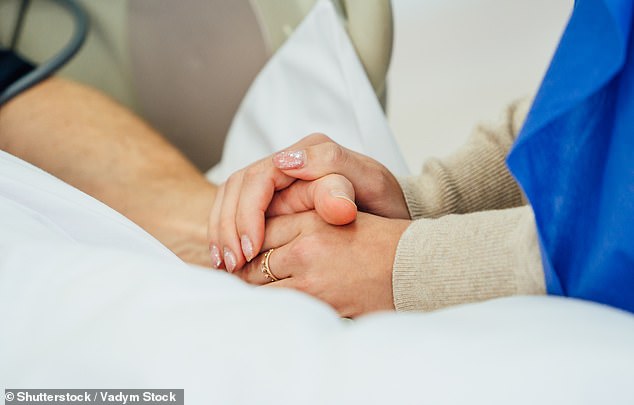A judge has ruled that a heart attack victim who is critically ill should be allowed to die following a legal battle between his wife and his mother.
The patient, a middle-aged man identified only as ‘RS’ due to an anonymity order, suffered a cardiac arrest in November last year, during which his heart stopped for at least 45 minutes, causing ‘severe and irreversible’ brain damage.
On December 15, a judge ruled that it was ‘not in RS’s best interests’ to have his life sustained through medical treatment, including nutrition and hydration, and that ‘such treatment could be lawfully discontinued’.
Mr Justice Cohen said that RS should be provided with palliative care to make sure he ‘retained the greatest dignity and suffered the least discomfort until such time as his life comes to an end’.
The University Hospitals Plymouth NHS Trust is now permitted to withdraw life-sustaining treatment to RS, as of 4 pm on January 7, the Court of Protection has decided.
The application to bring RS’s life to an end was supported by his wife, but opposed by his mother, who lives in Poland, as well as his two sisters and niece.
RS’s mother, whose name cannot be published under the court order, said she was ‘devastated’ over the ruling, saying that British authorities are trying to bring in ‘euthanasia by a back door.’
The applicant, a middle-aged man identified only as ‘RS’ due to an anonymity order, suffered a cardiac arrest on November 6 last year, during which his heart stopped for at least 45 minutes, causing ‘ severe and irreversible’ brain damage (stock image)
RS had not been responsive to stimuli of any sort following the cardiac arrest, although he did spontaneously open and move his eyes but without fixing or tracking, the court heard.
He showed no characteristic features of discomfort or distress to stimuli which would be painful to a feeling person.
‘It was self-evident that RS lacked capacity to make any decision for himself,’ the judge said in his ruling.
‘The focus of disagreement was on what RS’s views would be if he was able to make a decision in his current predicament.
‘His birth family said that his strong Catholic faith would mean that the sanctity of life would triumph over all other considerations.
‘His wife said that from her conversations with him she can say with certainty that he would never have wanted to have been kept alive if he could not be helped and he would not have ever wanted to be a burden.
‘His present state was causing great distress to his wife and their children, as it would be to him if he could feel it or express it.
‘I accepted RS’s wife’s evidence of his views, especially against the background of what was a significant estrangement between RS and his birth family to the extent that his only relatives in this country, that is his niece and her family, had not seen him for at least 9 years.’
The birth family’s case had relied on videos taken during a Hospital visit on Christmas day, and the opinion of a consultant neurologist, Rev. Dr Patrick Pullicino, to argue that RS’s condition had improved since the court’s original decision.

‘It was self-evident that RS lacked capacity to make any decision for himself,’ the judge said in his ruling (stock image)
Dr Pullicino told the Court that the man had a 50% chance of eventually recovering from his brain injury so as to be independent within his house, Christian Concern said in a press release.
The judge initially imposed reporting restrictions prohibiting any mention of Poland as RS’s country of origin, but changed his mind and lifted the ban on Friday 1 January 2021.
Mr Justice Cohen also rejected the evidence of Rev. Dr Pullicino, who is an ordained Catholic priest as well as a consultant neurologist.
The judge said he ‘did not find Dr Pullicino a satisfactory witness’ and that he was ‘concerned’ about Dr Pullicino’s ‘level of objectivity’.
He refused the family’s request for permission to arrange for an examination of RS by Dr Pullicino or another neurologist.
RS’s mother, whose name cannot be published under the court order, said: ‘I am devastated that the British authorities have decided to dehydrate my son to death.
‘I want to take my son back to his own country, where I would be allowed to care for him.
‘What the British authorities are trying to do to my son is euthanasia by a back door.’
